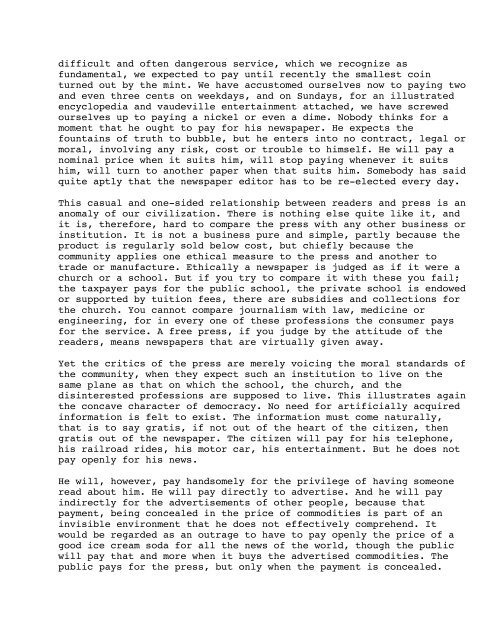PUBLIC OPINION by WALTER LIPPMANN TO FAYE LIPPMANN ...
PUBLIC OPINION by WALTER LIPPMANN TO FAYE LIPPMANN ...
PUBLIC OPINION by WALTER LIPPMANN TO FAYE LIPPMANN ...
Create successful ePaper yourself
Turn your PDF publications into a flip-book with our unique Google optimized e-Paper software.
difficult and often dangerous service, which we recognize as<br />
fundamental, we expected to pay until recently the smallest coin<br />
turned out <strong>by</strong> the mint. We have accustomed ourselves now to paying two<br />
and even three cents on weekdays, and on Sundays, for an illustrated<br />
encyclopedia and vaudeville entertainment attached, we have screwed<br />
ourselves up to paying a nickel or even a dime. Nobody thinks for a<br />
moment that he ought to pay for his newspaper. He expects the<br />
fountains of truth to bubble, but he enters into no contract, legal or<br />
moral, involving any risk, cost or trouble to himself. He will pay a<br />
nominal price when it suits him, will stop paying whenever it suits<br />
him, will turn to another paper when that suits him. Somebody has said<br />
quite aptly that the newspaper editor has to be re-elected every day.<br />
This casual and one-sided relationship between readers and press is an<br />
anomaly of our civilization. There is nothing else quite like it, and<br />
it is, therefore, hard to compare the press with any other business or<br />
institution. It is not a business pure and simple, partly because the<br />
product is regularly sold below cost, but chiefly because the<br />
community applies one ethical measure to the press and another to<br />
trade or manufacture. Ethically a newspaper is judged as if it were a<br />
church or a school. But if you try to compare it with these you fail;<br />
the taxpayer pays for the public school, the private school is endowed<br />
or supported <strong>by</strong> tuition fees, there are subsidies and collections for<br />
the church. You cannot compare journalism with law, medicine or<br />
engineering, for in every one of these professions the consumer pays<br />
for the service. A free press, if you judge <strong>by</strong> the attitude of the<br />
readers, means newspapers that are virtually given away.<br />
Yet the critics of the press are merely voicing the moral standards of<br />
the community, when they expect such an institution to live on the<br />
same plane as that on which the school, the church, and the<br />
disinterested professions are supposed to live. This illustrates again<br />
the concave character of democracy. No need for artificially acquired<br />
information is felt to exist. The information must come naturally,<br />
that is to say gratis, if not out of the heart of the citizen, then<br />
gratis out of the newspaper. The citizen will pay for his telephone,<br />
his railroad rides, his motor car, his entertainment. But he does not<br />
pay openly for his news.<br />
He will, however, pay handsomely for the privilege of having someone<br />
read about him. He will pay directly to advertise. And he will pay<br />
indirectly for the advertisements of other people, because that<br />
payment, being concealed in the price of commodities is part of an<br />
invisible environment that he does not effectively comprehend. It<br />
would be regarded as an outrage to have to pay openly the price of a<br />
good ice cream soda for all the news of the world, though the public<br />
will pay that and more when it buys the advertised commodities. The<br />
public pays for the press, but only when the payment is concealed.





